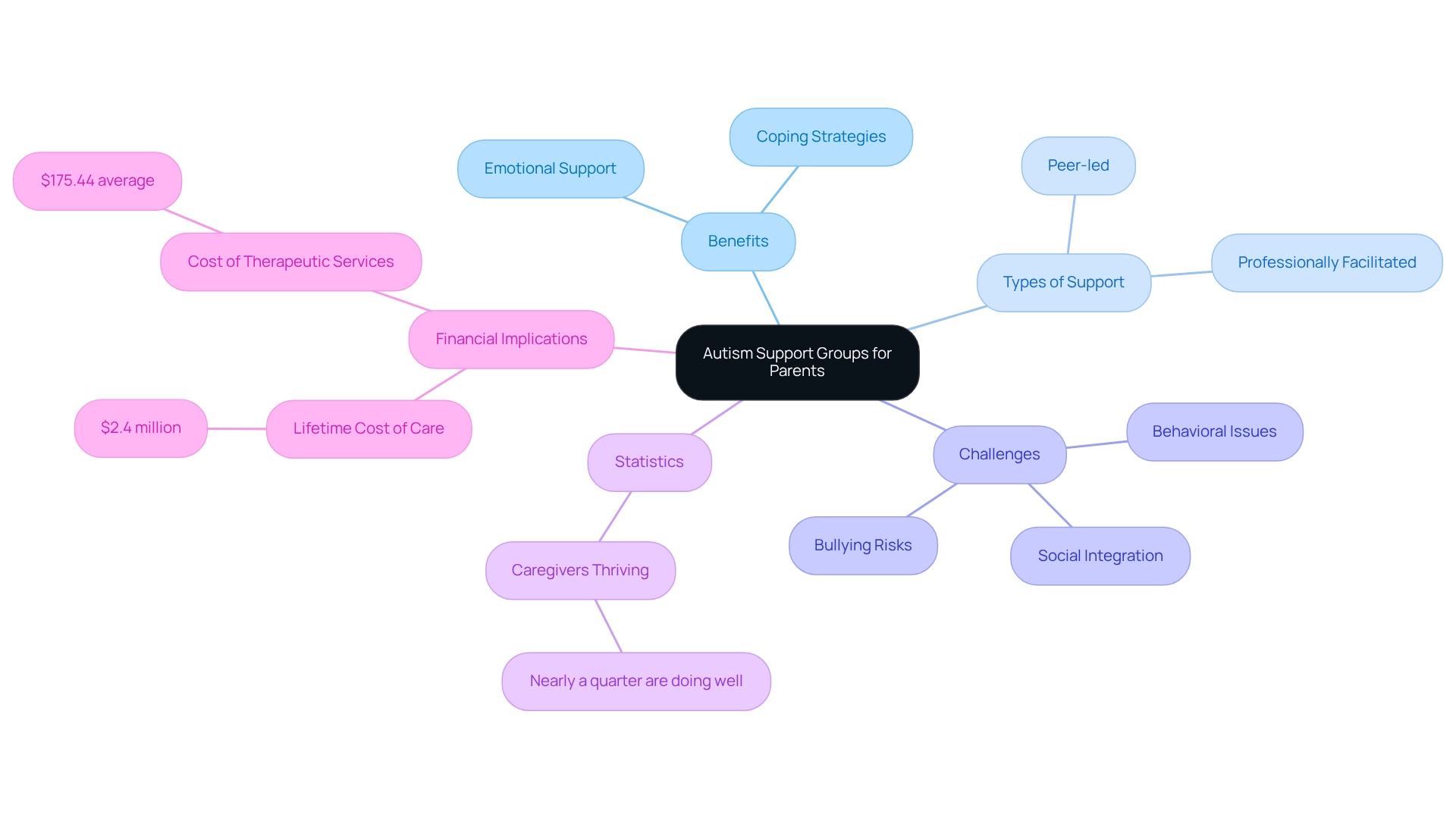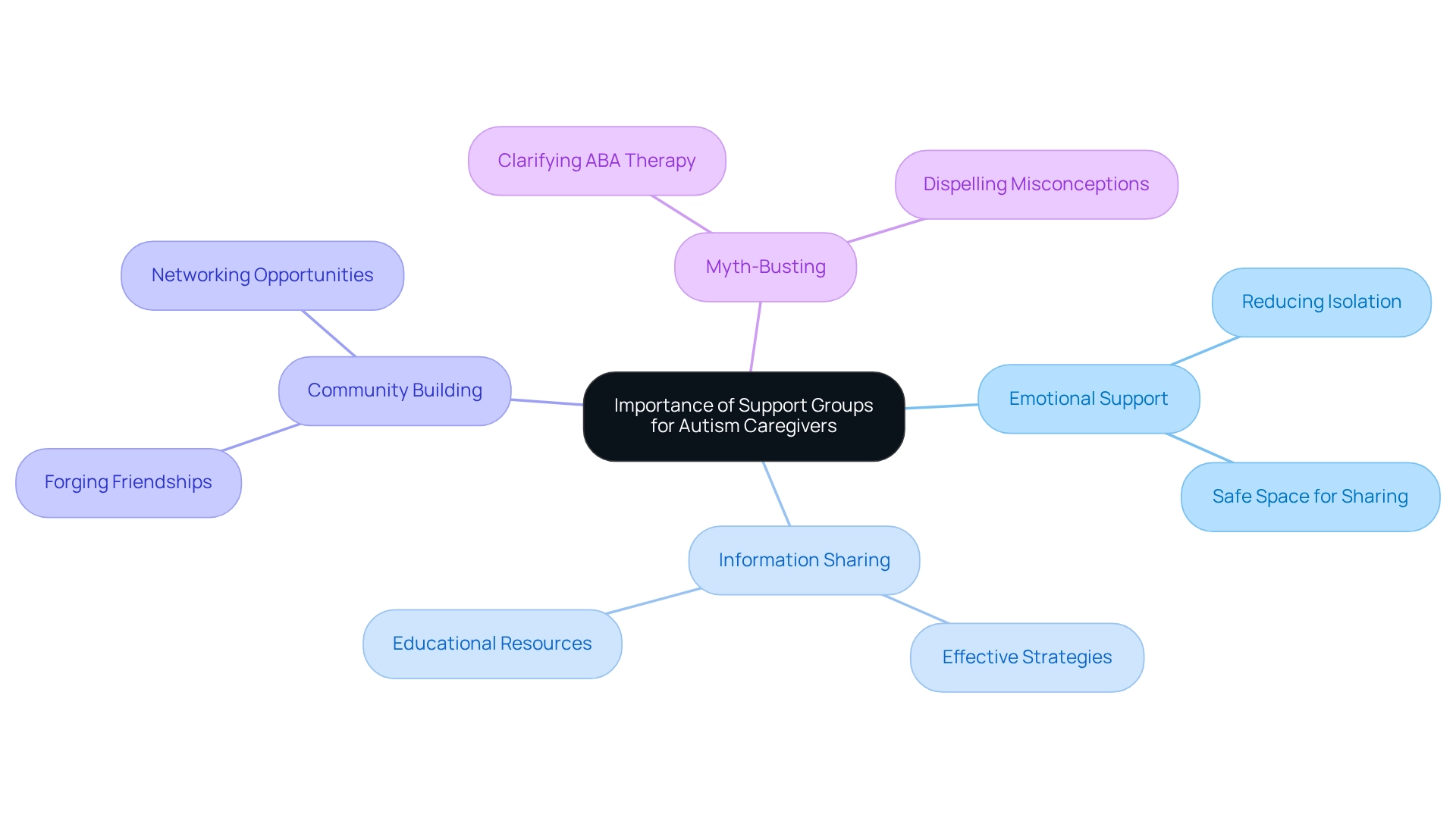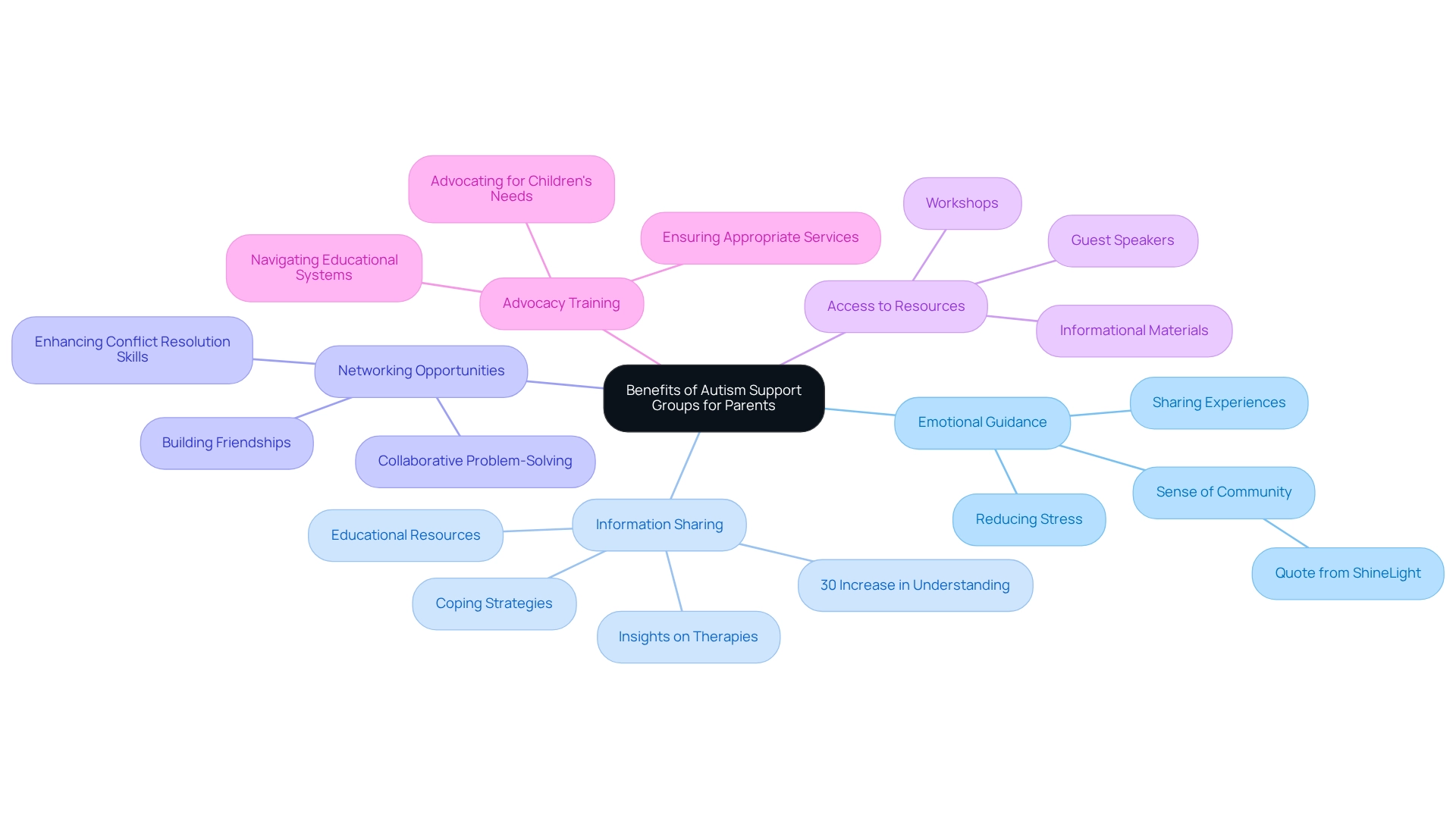Overview
Autism support groups for parents are essential. They offer:
- Emotional guidance
- Opportunities for information sharing
- Networking
- Access to vital resources
- Advocacy training
These elements significantly enhance caregivers' ability to navigate the complexities of raising a child with autism spectrum disorder (ASD). Imagine the relief of connecting with others who understand your journey. These groups create a sense of community and belonging, which can profoundly reduce feelings of isolation and stress. Through shared experiences and valuable insights, caregivers are empowered to face their challenges with renewed strength. Have you considered joining a support group? It could be the key to finding the understanding and encouragement you need.
Introduction
Navigating the complexities of raising a child with autism spectrum disorder (ASD) can feel like an overwhelming journey for many parents. It’s a path filled with unique challenges and profound moments. Autism support groups have emerged as crucial lifelines, providing a safe space where parents can connect, share their experiences, and seek guidance from those who truly understand their struggles. These gatherings, whether in-person or online, foster a sense of community and offer emotional support, helping to alleviate feelings of isolation and stress.
With approximately 1 in 36 children in the United States affected by autism, the significance of these support networks cannot be overstated. They empower parents with valuable information and coping strategies while also creating lasting friendships that extend beyond the meetings. As families navigate the unique demands of autism, these groups stand as a beacon of hope and resilience, paving the way for informed parenting and enhanced outcomes for their children. If you’re seeking connection and understanding, consider reaching out to a local support group or an online community. You are not alone on this journey.
Define Autism Support Groups for Parents
Autism support groups for parents are vital gatherings, whether in-person or virtual, designed for guardians of children with autism spectrum disorder (ASD) to connect, share experiences, and seek guidance. These networks cultivate a nurturing environment where caregivers can openly discuss the unique challenges they encounter, such as behavioral issues, educational needs, and social integration. By engaging with others who share similar experiences, caregivers can gain valuable insights, exchange coping strategies, and develop a sense of belonging within the community.
Support networks can manifest in various ways, from peer-led discussions to professionally facilitated meetings. They often concentrate on specific themes, including advocacy, therapy options, and self-care for caregivers. Importantly, participation in these communities has been shown to positively impact caregivers' well-being. Research indicates that nearly a quarter of caregivers report thriving in all aspects of their lives, despite the challenges of raising a child with ASD. This statistic underscores the crucial role these organizations play in providing emotional and practical support.
The presence of autism support groups for parents is significant, as many caregivers actively seek to enhance their understanding and management of autism-related challenges. The financial implications of autism are substantial, with the lifetime cost of care for an individual potentially reaching up to $2.4 million. Furthermore, the average cost of therapeutic behavioral services in the U.S. is approximately $175.44, highlighting the financial pressures families endure. This reality emphasizes the essential need for robust support systems, such as autism support groups for parents, and resources, making these organizations invaluable assets for families navigating the complexities of autism. Additionally, it is essential to recognize that individuals on the spectrum are at a heightened risk of bullying, further illustrating the necessity for supportive networks that can aid caregivers in addressing such issues.

Explore the Importance and Role of Support Groups
Support groups for caregivers of individuals with autism, specifically autism support groups for parents, are vital for many reasons. They provide emotional support, allowing caregivers to share their feelings, frustrations, and triumphs in a safe, non-judgmental space. This emotional outlet can greatly reduce feelings of isolation and stress, common among those caring for individuals with special needs. With autism affecting approximately 1 in 36 youth in the United States, the importance of supportive networks cannot be overstated.
These organizations also serve as platforms for exchanging valuable information and resources. Caregivers can learn effective strategies for managing their child's behavior, access educational materials, and navigate healthcare systems. For example, a case study on creating inclusive classroom environments showed that supportive practices not only improved social interactions but also led to better academic outcomes for children with autism. This underscores the impact of informed parenting, which can be enhanced through support networks.
Moreover, these circles often foster a sense of belonging, where caregivers can forge lasting friendships and connections that extend beyond meetings, creating a network that is invaluable during challenging times. As Steven Zauderer points out, caregivers can engage with these organizations at their convenience—whether during a break from daily responsibilities or in the evenings when their children are asleep. This flexibility encourages greater participation and connection, further alleviating feelings of isolation.
Additionally, addressing the myths surrounding ABA therapy is essential. By dispelling these misconceptions, caregivers can gain accurate information, enhancing their ability to support their children effectively. Resources like LiveWell Counseling, which offers individual and family therapy, medication management, and support for families affected by autism, can be incredibly beneficial for caregivers seeking additional help.
In conclusion, autism support groups for parents play a crucial role in providing emotional assistance, sharing resources, and building community among caregivers. By improving their ability to navigate the challenges of raising a child with autism, these networks empower caregivers to thrive in their important roles.

Identify Key Benefits of Autism Support Groups for Parents
The main advantages of autism support groups for parents are both profound and impactful. First, consider Emotional Guidance: Caregivers can share their experiences and emotions, which helps to reduce stress and fosters a sense of community. As ShineLight aptly states, "Assistance is accessible and other caregivers of kids with autism are here to guide you as well." This connection can be incredibly comforting. Next, there's Information Sharing: Members exchange valuable insights about therapies, educational resources, and coping strategies, enhancing their ability to support their children effectively. In fact, data indicate that caregivers who engage in assistance networks report a 30% increase in their understanding of available resources. Additionally, Networking Opportunities are crucial; support networks encourage connections among caregivers, leading to friendships and collaborative problem-solving. This camaraderie can significantly enhance conflict resolution skills, essential for navigating challenges. Furthermore, caregivers gain Access to Resources: Numerous organizations provide workshops, guest speakers, and informational materials that empower caregivers with essential knowledge and skills. Lastly, Advocacy Training is often a key component of these networks, teaching caregivers how to advocate for their children's needs within educational and healthcare systems, ensuring they receive appropriate services. Overall, these advantages contribute to improved outcomes for both caregivers and their children, making autism support groups for parents an invaluable resource within the autism community. For instance, a case study on reducing attention-seeking behaviors in children with autism revealed that focused ABA strategies, shared within assistance networks, led to notable behavioral improvements, positively affecting classroom dynamics. This underscores the importance of information sharing in support groups, as parents can learn effective strategies from one another. Have you experienced similar benefits? We encourage you to share your thoughts and stories, as your voice matters in this community.

Conclusion
Parenting a child with autism spectrum disorder (ASD) can be an undeniably challenging journey. However, the presence of autism support groups serves as a transformative lifeline for many families. These networks not only offer a platform for emotional sharing but also equip parents with essential information and coping strategies tailored to their unique experiences. By fostering connections, these groups cultivate a sense of community that alleviates feelings of isolation, empowering parents to navigate their challenges with greater confidence and resilience.
The benefits of participating in autism support groups are truly manifold. Parents gain practical insights into effective therapies and educational resources, while also forming lasting friendships with others who share similar experiences. These gatherings profoundly empower parents, allowing them to exchange information and advocacy training, which can lead to improved outcomes for both themselves and their children. This reinforces the importance of informed parenting within the autism community.
Ultimately, engaging with an autism support group is a proactive step toward enhancing not only the well-being of parents but also the developmental prospects of their children. As the prevalence of autism continues to rise, the need for these supportive environments becomes increasingly critical. For those seeking connection and understanding, reaching out to a local or online support group can mark the beginning of a journey filled with empowerment, hope, and shared knowledge. Remember, you are not alone in this journey; a caring community awaits to walk alongside you.
Frequently Asked Questions
What are autism support groups for parents?
Autism support groups for parents are gatherings, either in-person or virtual, where guardians of children with autism spectrum disorder (ASD) can connect, share experiences, and seek guidance.
What is the purpose of these support groups?
The purpose of these support groups is to create a nurturing environment for caregivers to discuss challenges related to behavioral issues, educational needs, and social integration, while gaining insights and coping strategies from others in similar situations.
How do autism support groups benefit caregivers?
Participation in these groups positively impacts caregivers' well-being, with research indicating that nearly a quarter of caregivers report thriving in various aspects of their lives despite the challenges of raising a child with ASD.
What types of discussions or themes are common in these support groups?
Common themes in autism support groups include advocacy, therapy options, and self-care for caregivers.
What are the financial implications of raising a child with autism?
The lifetime cost of care for an individual with autism can reach up to $2.4 million, and the average cost of therapeutic behavioral services in the U.S. is approximately $175.44, highlighting the financial pressures families face.
Why are autism support groups considered essential for families?
Autism support groups are essential as they provide robust support systems and resources, helping families navigate the complexities of autism, including the risks of bullying faced by individuals on the spectrum.




